- Home
- John Bellairs
The Treasure of Alpheus Winterborn Page 4
The Treasure of Alpheus Winterborn Read online
Page 4
Mr. Monday slid the glass of beer across the counter to a customer, then turned and smiled at Anthony. “Yeah, it feels good to work, don’t it? Keep it up, kid, and maybe when you turn eighteen you can come down here and help me a bit.” He added cautiously, “If you feel like it, that is.”
Anthony didn’t know how he felt about his dad’s business. He knew that there was something not quite right about running a saloon. Kids made fun of him sometimes. They would come staggering up to him, pretending they were drunk and saying things like, “Hey, Tony, I just been to yer dad’s joint!” And if it was an okay place, how come his dad called it a cigar store? Anthony had seen his dad come home at night, and he had seen how tired he looked. Anthony figured that someday, some way, he would find an easier way of making a living.
Of course, he didn’t say any of this to his father. He just grinned and said, “Yeah, sure, Dad. That’d be great.”
It took Mr. Monday about twenty minutes to get everybody out and close up the saloon, but before long, he and Anthony were walking along down a shady side street toward home. Anthony glanced at his dad. He thought he looked very tired and worn. The flesh of his face was sagging, and it was very pale. There were dark hollows under his eyes, and he walked with a shuffling, weary gait. Every now and then he would stop and pull out a handkerchief and mop his forehead.
“Boy, it sure is hot today!” Mr. Monday sighed. “When I get home, I think I’ll climb into the tub and take a nice cold—oh! Oh, my gosh!”
Mr. Monday stopped walking. He put his hand to his chest—to his left side, where his heart was. For a moment he just stood there, breathing heavily.
“What’s wrong, Dad?” said Anthony anxiously. “How come you had to stop like that?”
Mr. Monday shook his head and started to walk on. “I dunno, Tony, I just don’t know. I feel lousy these days. It must be the heat. Sometimes I feel all limp and wishy-washy, like there wasn’t any strength left in my body. And then I get these pains, like just now. Right across my chest, like somebody was stickin’ hot knives into me. I think I must of thrown my arm out when I was rasslin’ kegs down from the truck last week.”
“Maybe you oughta go see Doc Luescher, Dad. He’d find out if there was anything wrong.”
Mr. Monday shrugged. “Aah, what does he know? It’s just my shoulder. That’s all it is. When this heat wave breaks, I’ll feel better.”
Mr. Monday didn’t like doctors much. He was always boasting that he’d never had a sick day in his life, which was not exactly true. He got colds and the flu like everybody else, but after his illnesses were over with, he liked to think that he had cured himself. He was a kind man, but he had a streak of stubbornness in him about anything that had to do with his health.
“Dad,” said Anthony after they had walked a little farther, “are you sure you don’t think you oughta go see Doc Luescher?”
“Sure I’m sure,” growled Mr. Monday, and he gave his son an irritated glance that meant he didn’t want to talk about doctors and ailments any more.
And for the time being, that was the end of it.
Two days passed. The heat wave went on. The thermometer stood at eighty in the middle of the night, and during the day the sky had that yellow, brassy look that it sometimes has during heat waves. Each evening when the sun went down, it was a red ball, swimming in a sea of blue vapor.
One noontime, Anthony, his brother, and his mother were sitting around the big round table in the kitchen, waiting for Mr. Monday. They always waited till he got home before they started eating—it was one of their little family rules.
The screen door slammed. Everyone looked up. It was Mr. Monday. He stood there swaying, just inside the door, white as a sheet, with a glazed look in his eyes. His hand was clutched over his heart.
“My God, Howard, what’s wrong?” Mrs. Monday exclaimed. Mr. Monday said nothing. Moving heavily and sluggishly, he stomped past the kitchen table and staggered through the living room into the front room. He was headed toward the parlor.
Anthony, Keith, and Mrs. Monday watched him with fear and astonishment in their eyes. Then they jumped up, knocking over chairs in their haste, and ran into the parlor. When they got there, they found him slumped on the couch. His face was red now, red as a beet, and he was breathing like a horse. His left arm hung limp, and with his right hand he was fumbling with his tie, trying to loosen it. His shirt was soaked with sweat, and under it his chest was going up and down rapidly.
“Oh, my God!” screamed Mrs. Monday. “Oh, my God, oh, my God, oh, my God! What is it, Howard? What happened? What happened? Oh, God, please, somebody, do something! Do something!” She threw herself down at her husband’s side and started weeping hysterically.
“Jesus,” said Keith in a low, awe-stricken voice. “We better call Doc Luescher. We better call him quick.” He rushed to the phone and started dialing. Mrs. Monday kept on weeping, her arms around her husband’s neck. Mr. Monday didn’t say anything. He couldn’t. He just went on panting. Anthony stood watching, horrified. He felt numb and helpless.
Twenty minutes later, Doc Luescher’s big black Cadillac pulled into the driveway outside the Mondays’ house. Doc Luescher was a tall, elderly man who always wore black suits that looked as if he had slept in them. His white hair was parted down the middle and lay in two even sheaves on top of his head. His face was small and square, and he had bushy white eyebrows. Anthony thought he looked like an owl.
Keith went to the door and opened it. “Hi, Doc. It’s my dad,” he said in a low voice, motioning toward the parlor. “I think he’s had a heart attack or something. He’s in there.”
Doc Luescher said nothing. He just walked into the parlor, knelt down, and opened his black bag.
Mrs. Monday was sitting on a straight chair next to the couch. Her face was streaked with tears, and she had a handkerchief in her hands that she kept wadding and unwadding. Mr. Monday lay stretched out on the couch. His tie was off, and his shirt collar was open. He wasn’t breathing so hard now, but his face was very pale. His eyes were closed.
Doc Luescher reached into his bag and took out a stethoscope and listened to Mr. Monday’s heart. Then he took his blood pressure.
“How bad is it, Doctor?” asked Mrs. Monday anxiously.
“It’s not good,” said Doc Luescher as he unsnapped the cloth from Mr. Monday’s arm. “It’s not good at all.”
“Is it his heart, Doctor?” Keith asked.
The doctor nodded. “It sure is,” he said.
Mrs. Monday began crying again. The doctor glanced sourly at her.
“Oh, don’t go all to pieces, Ginny,” he muttered. “People have heart attacks all the time, and this here one that Howard’s had is a fairly mild one, as such things go. We’ve got to be careful, though. There might be another one on the way, and that’s what we’ve got to watch out for.” He folded up the stethoscope and put it away. Then he turned back to Mr. Monday. “Howard, you just lie still for now. I’m going to phone the hospital and have them send an ambulance around to take you there so we can do an electrocardiogram and some other things.”
“Will I have to stay in the hospital?” Mr. Monday’s voice, which was normally loud and cheerful, now sounded faint and whispery.
Doc Luescher shrugged. “Dunno. That will all depend, like they say. Just you lie there now. That’s all I want you to do.”
Mr. Monday did as he was told. He didn’t have the strength to resist. As soon as Doc Luescher was sure that his patient was resting comfortably, he called the hospital. A few minutes later, a big white ambulance pulled up outside.
As Anthony and Keith stood watching and as Mrs. Monday sniffled loudly, two men in white uniforms got out, opened up the back doors of the ambulance, and took out a rolled-up stretcher. They came in the front door and unrolled the stretcher on the parlor floor.
“It’s okay, I can walk,” said Mr. Monday, and he started to get up.
“Relax, Howard,” said Doc Luescher, gently easin
g him back onto the couch. “It isn’t every day you get a free ride. Sit back and enjoy it.”
Reluctantly, Mr. Monday lay back and let the two attendants ease him onto the stretcher. Out the door they went and down the front steps.
“Oh, what are we gonna do, what are we ever gonna do?” wailed Mrs. Monday in a choked, weepy voice.
“He’s gonna be all right, Ginny,” said the doctor, patting her on the back. “Don’t worry now,” he added, even though he knew that saying “Don’t worry” to her was like saying “Don’t breathe.”
Mr. Monday only stayed in the hospital overnight, but when he came home, he had a fistful of prescriptions for pills he had to take, and he had strict orders from Doc Luescher: He couldn’t do any work of any kind for two whole weeks. After that, the doctor promised he would check him over again and see if he could go back to work. Mrs. Monday went down to the store and taped a sign up in the plate-glass window of the front door. It said I CLOSED DUE TO ILLNESS.
The awful thing had happened: Mr. Monday couldn’t work.
As far as Mrs. Monday was concerned, it was the end of the world, or pretty close to it. It didn’t do any good for Doc Luescher to tell her that her husband would very likely be able to go back to work someday soon. Neither did it do any good for Mr. Monday to remind his wife that they had some money in the bank that they could live on for the time being. As far as Mrs. Monday was concerned, the axe had fallen.
Not surprisingly, Anthony caught the worry bug from his mother. Fear gnawed at him, fear that his dad would never work again and that they would soon be out in the street. Miss Eells tried to reassure him, but what did she know, Anthony thought. She wasn’t a doctor.
In the midst of his fear, Anthony turned to the mysterious message he had found, the message containing the poem that was supposed to be the key to a hidden treasure. He had bought a small black ring-binder and some paper at the ten-cent store and had taped each of the crackly, curly pages of the message on a separate sheet of paper. Then he put the pages in the binder. He brought the binder to work with him each day, and at odd moments he would pull it out and pore over the poem. But so far it hadn’t yielded one tiny little glimmer of meaning to him. Not one.
Anthony, however, was persistent. Night after night he sat up with his desk lamp on, reading the poem over and over and over. At the library, Miss Eells would find him sitting at the circulation desk, staring fiercely at the mysterious words until the sweat ran down his face. Several times she tried to get him to quit, but he wouldn’t. As far as he was concerned, the treasure of Alpheus Winterborn was his family’s only hope, and he would find it or go crazy trying.
Sometimes Miss Eells was actually a bit afraid that Anthony would go crazy, and she began to search her brain for something that would take Anthony’s mind off the treasure.
One Friday afternoon, while she was sitting in her office and reading the paper, Miss Eells noticed that there was going to be an auction out in Rolling Stone, a very small town about six or seven miles from Hoosac. Miss Eells liked auctions. She liked the crowds and poking about among pieces of furniture, and the bibble-babble of the auctioneer, and the excitement of the bidding. She decided that she would ask Anthony to go along with her.
When she found him, he was running around the East Reading Room, chasing a fly that had gotten in.
“Anthony, there’s going to be an auction out in Rolling Stone tomorrow afternoon. I wondered if you’d like to go to it with me. I can get Mrs. Pratt from the branch library to take over here for the day. There’d be no problem. Afterward, we could go down the river to that new ice cream stand I told you about.” Miss Eells was an expert on ice cream stands. She knew about all the good ones for miles around. “They’ve got a lot of good flavors, I hear,” she added hopefully. “Like banana and blue moon and ginger. You don’t find many stands that have ginger. Come on, what do you say? Let’s give it a try, eh? Please come with me, just this once. Then you can go back to that darned poem and pore over it to your heart’s content.”
Anthony hesitated. He bit his lip and rattled the change in his pocket. “Okay,” he said at last.
Miss Eells smiled happily and clapped her hands. “Good! That was what I hoped you’d say. Now, run on back to the main desk and see if anybody wants anything. I’ll see you later.”
CHAPTER 6
The next day, right after lunch, Miss Eells picked Anthony up, and they drove out to Rolling Stone to the auction. It was a beautiful day—the last day of August, but chilly, with a hint of fall in the air. When they got to Rolling Stone, they found that a good-sized crowd had already gathered on the lawn of the house where the auction was to take place. It was the house of a lady named Bjornson, who had just died at the age of ninety-four. Mrs. Bjornson had been a widow for the last fifty years, and after her husband died, she had kept her house just the way it had been around the turn of the century. All the furniture was old-fashioned, and there were even gas lamps on the walls, though they no longer worked. In addition to all this, Mrs. Bjornson had been a great buyer of antiques. She had gone to a lot of auctions in her life, and she had bought a lot of things, some of them quite valuable. Now that she was dead, her own things were being auctioned off.
Anthony and Miss Eells walked through the old, stale-smelling house, and then poked around among the furniture and other odds and ends that were scattered on the lawn, waiting to be sold. There were bureaus and commodes, marble-topped tables, oil lamps, sets of dishes and boxes of old records and a crank-up phonograph, an Atwater Kent radio, and all sorts of weird-looking doodads and whatchamacallits. Miss Eells opened and closed drawers and peered into pitchers and almost dropped a heavy, old-fashioned flatiron on her foot. Anthony got a little worried watching her because every time she turned around she would bump into somebody or something. Finally, she broke a small vase. She took the pieces up front to the auctioneer, who was just getting ready to climb up onto his stand. His name was Mr. Gegenfurtner. He was a big, red-faced man who ran a clothing store in Hoosac and did auctioneering because he liked it. He and Miss Eells were old friends. When he saw her coming toward him with the broken vase in her hands, he grinned.
“Well, hello, Myra! Did you break that Ming vase? That’ll be forty-five thousand dollars, if you don’t mind. Come on, hurry up. Pay.”
“Oh, be quiet, Charley. How much is it worth, really?”
“I’d say about thirty-five cents. Give me a quarter, and I’ll let you go. Say, who’s your friend there?”
“This is Anthony Monday. He works at the library. Anthony, this is Mr. Gegenfurtner.”
“Hi,” said Anthony shyly.
A few moments later, Anthony and Miss Eells were back out on the lawn, milling around with the crowd. Mr. Gegenfurtner had started auctioning things off. Anthony loved to listen to him babble: “Three, three, who’ll gimmee three, threena quatta, threena quatta, quattava dollah, quattava dollah...” It was like a foreign language that Mr. Gegenfurtner was speaking. Anthony couldn’t figure out how anybody managed to follow the bidding, but they did. People held up their hands and yelled things, and items got sold—books and pictures and tables and chairs and vases. So far, Miss Eells hadn’t bid on anything. She was still inspecting the goods.
Anthony was beginning to get bored. He wandered off by himself and sat down on a glider—a kind of porch swing that looks like a sofa—that had been hauled down off the porch and left under a big elm tree. As he rocked back and forth, back and forth, he found that he was singing “Acorns up and windows o-ver” in time with the squeaks. It was no use, it was just no use. He couldn’t get the poem or the treasure out of his mind....
Suddenly he stopped swinging. He planted both feet on the ground and stared fixedly, as if he had been hypnotized. Not far away from him was Hugo Philpotts, holding what appeared to be a small picture in a wooden frame. Hugo Philpotts, the man who had changed his ten-dollar gold piece at the bank, the man who was related to Alpheus Winterborn.
As Anth
ony watched, Mr. Philpotts carefully examined the picture, or whatever it was. He turned it over, and as he did so, something flashed in the sun. The thing he was looking at was a mirror. Suddenly there popped into Anthony’s mind the title of Alpheus Winterborn’s mysterious poem: “Mirror, Mirror.” The title didn’t seem to have anything to do with the poem, and once when Miss Eells was trying to help Anthony with the poem, she had guessed that the title might have something to do with an object that you were supposed to be hunting for instead.
Mr. Philpotts was really interested in this mirror. He examined the back of it and stared at one corner down at the bottom for a very long time. Finally, he set the mirror down.
When Mr. Philpotts left, Anthony slowly walked over to where the mirror lay. He knelt down and looked at it. Like Mr. Philpotts, he turned it over and examined the back, especially the lower part. Then he jumped up and ran off to get Miss Eells.
Miss Eells, however, was having her own problems— she had somehow managed to get her foot wedged into a small brown crockery jug. Two men were trying to get her out. Mr. Gegenfurtner held her down on a couch while the other man tugged at the crock. But the foot wouldn’t come out.
When Anthony arrived on the scene, he was out of breath and excited. “Hey, Miss Eells, I been looking all over for you! We got to—oh, my gosh! What happened?”
“Well you may ask,” groaned Miss Eells. “I was only climbing over a pile of stuff to get from one place to another, and I managed to do this to myself. Unh!” Miss Eells winced as the man tugged again. All of a sudden, the jug popped loose, and Mr. Rusk, the man who had been doing the tugging, careened off across the lawn and slammed into the back of a lady who was peering into an old chest. The lady fell forward over the chest, which snapped shut on one end of a long feather boa that she was wearing. When the lady got her wind back, she found that the trunk lid had chopped off one end of her boa. She started to rant at Mr. Rusk, who began to rant right back at her.

 The Curse of the Blue Figurine
The Curse of the Blue Figurine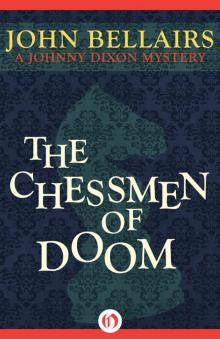 Chessmen of Doom
Chessmen of Doom Secret of the Underground Room
Secret of the Underground Room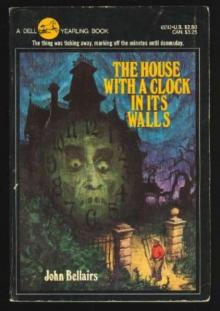 The House With a Clock in Its Walls
The House With a Clock in Its Walls The Vengeance of the Witch-Finder
The Vengeance of the Witch-Finder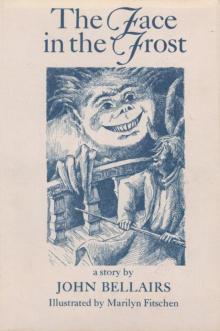 The Face in the Frost
The Face in the Frost Revenge of the Wizard's Ghost
Revenge of the Wizard's Ghost Spell of the Sorcerer's Skull
Spell of the Sorcerer's Skull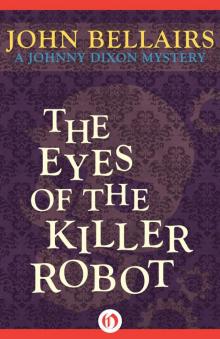 Eyes of the Killer Robot
Eyes of the Killer Robot Mummy, the Will, and the Crypt
Mummy, the Will, and the Crypt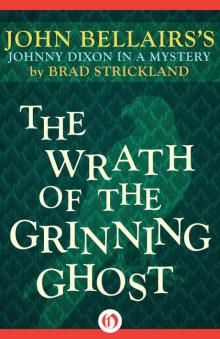 Wrath of the Grinning Ghost
Wrath of the Grinning Ghost The Mansion in the Mist
The Mansion in the Mist The Doom of the Haunted Opera
The Doom of the Haunted Opera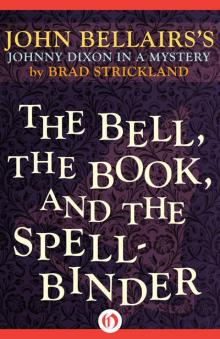 The Bell, the Book, and the Spellbinder
The Bell, the Book, and the Spellbinder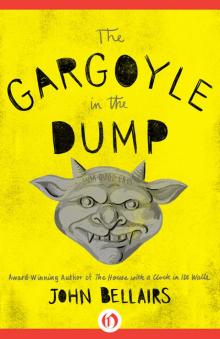 The Gargoyle in the Dump
The Gargoyle in the Dump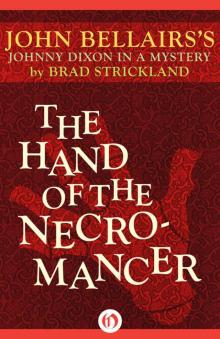 The Hand of the Necromancer
The Hand of the Necromancer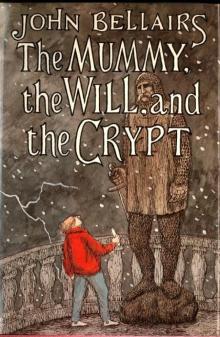 The Mummy, the Will, and the Crypt
The Mummy, the Will, and the Crypt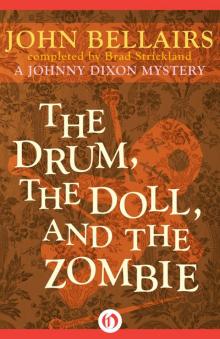 Drum, the Doll, and the Zombie
Drum, the Doll, and the Zombie The Specter from the Magician's Museum
The Specter from the Magician's Museum The Letter, the Witch, and the Ring
The Letter, the Witch, and the Ring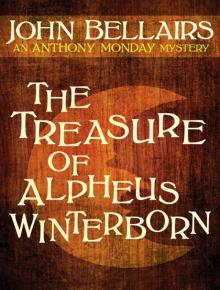 The Treasure of Alpheus Winterborn
The Treasure of Alpheus Winterborn The Dark Secret of Weatherend
The Dark Secret of Weatherend The Figure in the Shadows
The Figure in the Shadows